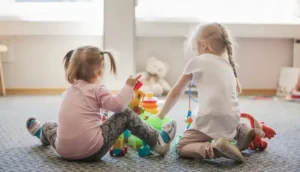Parental Divorce Through a Child’s Eyes: Supporting Your Child’s Well-Being

Divorce can be a challenging experience for children, often leading to feelings of insecurity, negative thoughts, and emotional distress. At OnSeminars, we understand the profound impact that parental divorce can have on a child’s mental health. Through our Child Psychology and Development seminar, we explore how children perceive divorce and offer practical strategies for parents to support their child during this difficult time. In this article, we’ll examine divorce from a child’s perspective and share expert tips to help parents navigate this transition with care and sensitivity.
The Emotional Impact of Divorce on Children
When parents decide to divorce, children often feel as though their world is falling apart. For a young child, the family unit provides a vital sense of stability and security, which is essential for their psychological well-being. The disruption caused by divorce can lead to significant emotional challenges, leaving children feeling helpless and uncertain. Many children struggle to understand that their parents’ decision to separate is not their fault, which can result in feelings of guilt and self-blame. This is particularly true for younger children, who tend to have an egocentric view of the world and may believe they are responsible for their parents’ separation.
How Do Children Perceive Parental Divorce?
Understanding how children perceive divorce is crucial for parents aiming to support their child effectively. For a child—especially a young one—the family is their entire world. The breakdown of this unit can feel catastrophic, shaking their sense of safety and peace. Children may worry that if their parents no longer love each other, they might also stop loving them. This fear can be compounded if parents become so focused on their own emotions during the divorce that they overlook the child’s need for reassurance. At OnSeminars, our live online seminars, such as the Child Psychology and Development program, delve into these dynamics, helping parents and professionals better understand and address children’s emotional needs during divorce.
Practical Tips for Parents: Supporting Your Child Through Divorce
Navigating a divorce while ensuring your child’s well-being requires careful planning and collaboration between parents. Here are some expert-recommended strategies to help your child adjust to this new chapter:
• Maintain Consistency in Daily Routines
Minimizing changes to your child’s daily routine can provide a sense of stability during the uncertainty of divorce. Whether it’s sticking to regular meal times, bedtimes, or school schedules, consistency helps children feel secure.
• Ensure Both Parents Remain Involved
Both parents should strive to stay actively involved in the child’s life post-divorce. Organizing shared activities, such as family outings, dinners, or school events, can reassure children that both parents are still there for them. Co-parenting with cooperation and respect is key to supporting your child’s emotional health.
• Listen to Your Child’s Voice
Involving your child in decisions that affect them—such as where they will live or how they’ll spend time with each parent—can help them feel valued and heard. While parents make the final decisions, considering the child’s preferences ensures they don’t feel sidelined during the process.
• Reassure Your Child It’s Not Their Fault
Children often blame themselves for their parents’ divorce, especially younger ones who struggle to separate their actions from external events. Parents must clearly and repeatedly reassure their child that the divorce is a decision between the adults and not a result of anything the child did. Remind them that both parents love them just as much as before.
Child Psychology and Development
🏷️ Only £70 per month
⏱️ Duration: 2 hours per week for 12 months
👨🏫 Taught by human instructor
💻 Remote Live learning
📖 Free study notes and resources
🎓 Option to receive a certificate of completion
Fostering Healthy Relationships Post-Divorce[1]
The relationship between divorced parents plays a critical role in a child’s well-being. Children often feel caught in the middle when parents display hostility towards each other. To prevent this, parents should strive to maintain a respectful and cordial relationship, even after divorce. This not only reassures children that they are loved by both parents but also sets a positive example for them to follow. Children learn by observing adult behaviour, and seeing their parents interact with kindness can help them feel safe and supported during this transition.
Helping Your Child Adjust to a New Normal
While divorce can be a difficult experience for children, parents who approach the situation with sensitivity and awareness can make the transition smoother. By fostering open communication, maintaining routines, and ensuring both parents remain involved, you can help your child adapt to their new reality without experiencing overwhelming emotional distress. It’s also important to recognize that staying in an unhappy marriage “for the sake of the children” can sometimes create a tense environment that negatively impacts the child. A well-managed divorce, handled with maturity and collaboration, can often be a healthier option for the entire family.
Learn More with OnSeminars
At OnSeminars, we’re committed to supporting parents and professionals in understanding and addressing the challenges children face, including the impact of divorce. Our Child Psychology and Development seminar offers in-depth insights into children’s emotional and psychological needs, equipping you with the tools to create a supportive environment for your child. Join our live online seminars today to explore topics like family dynamics, managing divorce, and fostering emotional intelligence in children. Visit our Live Seminars page to find the perfect program for you and start your learning journey with OnSeminars!

